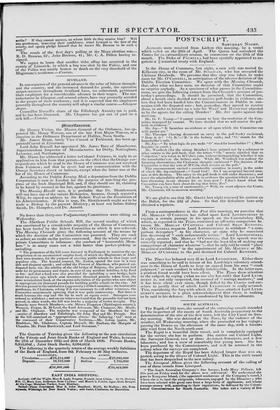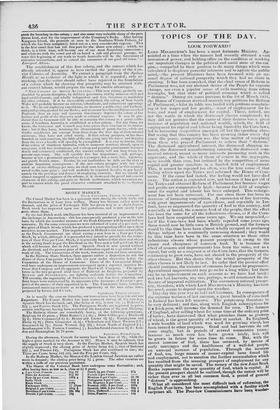SOUTH AUSTRALIA.
The Rapid, of 162 tons, the second of time surveying vessels intended for the inspection of the coasts of' South Australia preparatory to the determination of the site of the first town, left the City Canal on Sun- day morning. She was detained at the Nose, by the violence of the weather, till Wednesday morning, when she proceeded on her voyage ; passing the Downs on the afternoon of the same day, with a favour- able wind from the North-north-east.
The Rapid is a beautiful little vessel, and is completely equipped for the service she has to perform. She carries out Colonel Light, the Surveyor- General, two or three Assistant- Surveyors, and a few labourers; and has a crew of remarkably fine young men. She has been purchased by the Commissioners, and w:11 be retained in the colony when the surveys are completed.
The departure of the Rapid has been delayed longer than was ex- pected, owing to the illness of Colonel Light. This is the sixth vessel that has been despatched to the new colony. The Liverpool Albion gives the following account of the sailing of one of these vessels from Liverpool.
" The South Australian Company's fine barque, Lady Mary Pelham, left this port on Friday week for the above new settlement. We understand she goes to Kangaroo Island, (the appointed rendezvous of the Company's vessel,) where she is to land the emigrants, labourers, engaged by the Directors ; who have beet; selected with great care from a large body of applicants, and whose passage-money will, according to their regulations, be defrayed by the Coloni- sation Commissioners for South Australia. She takes cut a variety of live
Meek for breeding in the colony; end also some very valuable sheep of the pure Saxon kind, sent for the improvement of the Company'. flocks. After leaving Kangaroo Island, she proceeds at once to the Southern Whale Fishery, for which she has been completely fitted out at a very considerable expense. This is the first vessel that has left this port for the above new colony ; which, we think, in a little time, will become one of our most flourishing 7)ossessious ; and while we wish the vessel and all on boaid a safe and pleasant passage, we trust this beginning of our tiaile to South Australia will be the forerunner of extensive transactions, and so extend the commerce of our good old town."— _Liverpool Albion.
The establishment of this free colony, and the success which has already attended it, appear to have excited the jealousy of the Con- vict Colonies of Australia. We extract a paragraph from the Sydney _Herald, as an evidence of the light in which it is regarded ; only re- marking, that the writer should rather have rejoiced in the foundation of a colony which by showing that prosperity may be attained with- out conviet labour, would prepare the way for similar advantages.
" isivw Coroay or Sourer U sTR A LI A. —This new colony, perfectly un- shackled by prison discipline, by ibilitary governors, and by i lllll muse civil and legal establishments, and wholly independent and free, threatens to annihilate the other colonies. If it be successfully established, the colony of New South Wales will probably become an inferior, subordinate, and subservient iippendage to it. We tit out exploring expeditions, we discover a noble river and harbour, and good grazing ground for our flocks; and no sooner has the intelligence reached England, than an easy and ignorant functionary deprives the colony of the honour and profit of the discovery made ut colonial expense. It Ili ly be pre- dicted that no Governor will be able to maintain this colony as a penal settle- ment, if Southern Australia is established RS a free colony. For any thing we know, the Governor and Council may have given their sanetion to its forma- tion ; but if they have, retaining the abominations of penal slaverv, while our thrifty neighbours are exempt from them from the first day of their colonial existence, they have not acted wisely. If that colony prosier., or has been founded on such sanction, the fable of the axe going into the forest and begging from the trees a handle will speedily be exemplified. It is easy to foresee. that Utile colony of Southern Australia, with its immense territory already open to emigrant, with free institutions, and a cheap and popular government, bee 5 firmly and extensively established, this convict colony will not long retain her present supremacy. She will speedily lose her importance and, perhaps, become at last a piovincial appendage to a younger, but a mere free, vigorous, and purely British sister. Besides, let our landholders be fully on the alert to another important consequence : if the new colony prospers with her land rated at twelve shillings per acre, we shall soon have the latol in this country raised to the same price ; and will probably be required, besides, to pay hand- somely for the privilege and honour of employing convicts, lint we shuald almost tempted to approve of the scheme, if it destroyed the peen/ and eonsiet character of this colony, and gave us British institutions, which we cannot ex- pect to receive while the penal character continues attached to it. "—Sydney licruld.



























 Previous page
Previous page